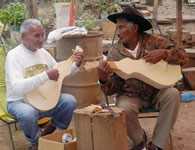 |
We can’t talk about Mato Grosso without mentioning the “viola-de-cocho”, a regional guitar that will have those who are not local wondering how it is possible to get a melody out of an instrument with five fishing lines and no resonance box. To explain, there’s no one better than Caetano Ribeiro dos Santos, one of the oldest makers of viola-de-cocho in Cuiabá, and his business partner Manoel Severino de Moraes. Despite his poor health, Caetano enjoys having visitors. “I will tell you a story while playing and singing.” And so he starts.
“My father used to make viola-de-cocho for himself. We wanted to dance at parties, and we needed a guitar. These ones are made out of a piece of carved wood. When I was 12 years old, living in Barão de Melgaço (MT), I started toying with pieces of wood and a pocket knife.” In 1946, he went to Cuiabá. “I used to make cast nets, but they were banned so I started making viola-de-cocho and haven’t stopped since.” Today, his entire family works in the trade. The names of the local wood used by them sound like a melody: ximbuva, xarã de leite, cajamanga, jacote and serigüela.
A guitar takes over 15 days to be completed, and there’s always a demand for them. “Before, I used to make them for myself, so I could play at the local festivals’, says Caetano. “Now there are many orders, because viola-de-cocho have become a product typical of Mato Grosso. We make proper ones and small ones, as souvenirs.”
His friend and partner, Manoel, has a similar story. He is proud to say he was born in Cuiabá and started making viola-de-cocho at 10 years of age (two years younger than his friend). He likes to challenge Caetano. “The best wood is from the mango tree. I used to eat the fruit and make guitars from the trunk. Nowadays, if you can find someone willing to cut down a mango tree, I’ll turn it into guitars.” Also retired, he complements his earnings with the instruments.
Caetano believes his guitars will keep going strong, because today virtuosi such as Abel Santos Anjos Filho use this guitar to play regional melodies and medieval tunes by classical masters. It is hard to believe the music comes from a viola-de-cocho. |


